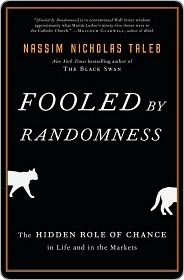More on this book
Community
Kindle Notes & Highlights
Read between
November 21 - December 3, 2020
It is as if there were two planets: the one in which we actually live and the one, considerably more deterministic, on which people are convinced we live. It is as simple as that: Past events will always look less random than they were (it is called the hindsight bias).
Jon Newman liked this
My motto is “my principal activity is to tease those who take themselves and the quality of their knowledge too seriously.”
The same delusion of mistaking irreverence for arrogance (as I noticed with my message) makes people confuse skepticism for nihilism.
Notice how our brain sometimes gets the arrow of causality backward. Assume that good qualities cause success; based on that assumption, even though it seems intuitively correct to think so, the fact that every intelligent, hardworking, persevering person becomes successful does not imply that every successful person is necessarily an intelligent, hardworking, persevering person (it is remarkable how such a primitive logical fallacy—affirming the consequent—can be made by otherwise very intelligent people, a point I discuss in this edition as the “two systems of reasoning” problem).
Symbolism is the child of our inability and unwillingness to accept randomness; we give meaning to all manner of shapes; we detect human figures in inkblots.


